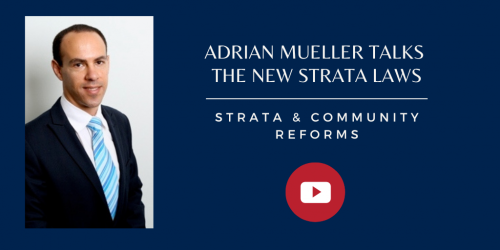Carpet inside an apartment in a strata building is common property. So too is paint on the walls and ceiling inside an apartment. Surely that can’t be right! But according to two Supreme Court Judges, it is.
Introduction
There are some truths that the strata industry has held to be self-evident for many years. For example, in the strata industry, it has long been held that carpet inside an apartment in a strata building forms part of the lot and is not common property and that the same can be said for paint on the walls and ceiling inside an apartment.
But sometimes in strata living (as in life) not everything is as it seems. A recent Supreme Court case makes that clear.
Carpet
In 2021, the owners corporation of a townhouse complex in Tweed Heads South sued the builder of the complex in the Supreme Court for damages arising out of construction defects. The case was heard by the Supreme Court in May 2024 and on 7 June 2024 the Court published its judgment.
During the course of its judgment, the Supreme Court had to consider whether or not the owners corporation was entitled to recover damages from the builder for consequential damage to carpets inside the townhouses that was caused by defects in the common property that had allowed water to leak into and cause damage to those townhouses including the carpets in them. The builder argued that the carpet inside the townhouses was lot property as a result of which the owners corporation could not claim compensation for the damage to the carpet.
The Supreme Court disagreed. The Court held that the carpet was installed inside the townhouses before the strata plan was registered and, relying on the Seiwa case, held that the lower horizontal boundary of each townhouse was the upper surface of its floor, namely the carpet. For these reasons, the Court concluded that the carpet in each townhouse was common property meaning the owners corporation could claim damages for the cost to remove all carpet and underlay and supply and install new carpet to match existing carpet as closely as possible: see The Owners – Strata Plan No. 99960 v SPS Building Contractors Pty Ltd [2024] NSWSC 687.
Cosmetic Work
The conclusion that carpet inside a strata lot is common property will not sit comfortably with many within the strata industry. That begs the question: did the Supreme Court get it right?
There is an indication in the Strata Schemes Management Act 2015 that it did. Section 109 of that Act allows an owner of a lot in a strata building to carry out cosmetic work to common property in connection with the owner’s lot without the approval of the owners corporation. Section 109 provides some examples of cosmetic work including laying carpet. This indicates that the legislature considered that carpet in a lot forms part of the common property.
Again, this conclusion will still not sit well with many in the strata industry. So is there any other support for it?
Paint
In 2010, the Supreme Court had to consider a claim by lot owners for damages to cover (among other things) the cost to repair water damage to ceilings and peeling paint work on ceilings in their lot. The Court concluded that the ceilings and the paint on them were not within the cubic space of the lot and therefore formed part of the common property: see Stolfa v Owners Strata Plan 4366 & Ors [2010] NSWSC 1507.
Again, section 109 of the Act provides support for the conclusion that paint inside a strata lot forms part of the common property. This is because section 109 says that painting a strata lot is cosmetic work to common property in connection with the lot.
Common Property Memorandum
There is further support for these conclusions in the common property memorandum. Section 107 of the Act permits an owners corporation to make a by-law to adopt a common property memorandum. The common property memorandum specifies whether an owner or the owners corporation is responsible for the maintenance and repair of certain common property.
The common property memorandum that has been prescribed under the strata regulations covers paintwork inside a lot including on a ceiling and internal carpeting. Whilst the common property memorandum allocates responsibility for the maintenance and repair of that paintwork and carpeting to owners, the inclusion of those items in the memorandum lends support to the conclusion that they form part of the common property, as strange as that might seem.
Conclusion
The conclusions reached by the Supreme Court will be surprising to many and turn longstanding thinking in the strata industry about some basic concepts on its head. Those conclusions are not entirely free from doubt and there is at least one case which goes the other way. Nevertheless, the Supreme Court decisions should give everyone in the strata industry pause for thought.

Adrian Mueller I BCOM LLB FACCAL I Partner
Since 2002 Adrian has specialised almost exclusively in the area of strata law. His knowledge of, and experience in strata law is second to none. He is the youngest person to have been admitted as a Fellow of the ACSL, the peak body for strata lawyers in Australia. Profile I Linked
Contact Us
For all strata law advice including by-laws, building defects and levy collections contact our specialist NSW and Sydney strata lawyers here or call 02 9562 1266, we’re happy to assist.


